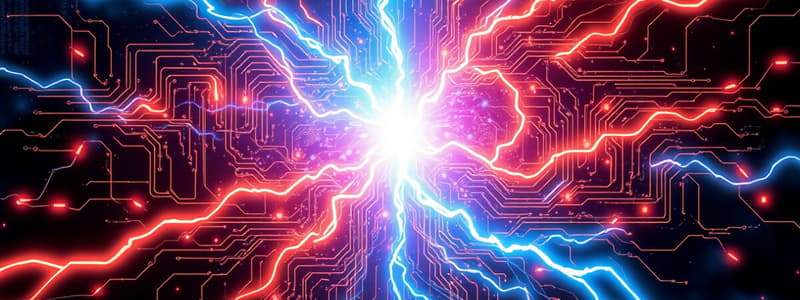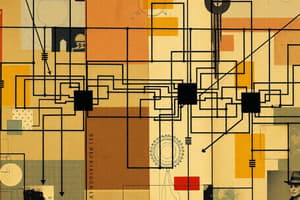Podcast
Questions and Answers
What is a series circuit?
What is a series circuit?
- When there is more than one path for the current to take.
- When there is only one path for the current to travel. (correct)
- When the circuit is broken.
- When the voltage is divided among components.
What is a parallel circuit?
What is a parallel circuit?
- When there is only one path for the current to travel.
- When multiple circuits are interconnected.
- When all components are connected in a line.
- When there is more than one path for the current to take. (correct)
What is electric current?
What is electric current?
A measure of the amount of electrical charge passing a particular point in a circuit.
What is the charge carried by 6 x 10^18 electrons called?
What is the charge carried by 6 x 10^18 electrons called?
What does more resistance mean for current?
What does more resistance mean for current?
What is the total resistance in a series circuit?
What is the total resistance in a series circuit?
What is the device used to measure current?
What is the device used to measure current?
What units are used to measure resistance?
What units are used to measure resistance?
What is Ohm's Law?
What is Ohm's Law?
What is the device used to measure voltage?
What is the device used to measure voltage?
What occurs when a short circuit happens?
What occurs when a short circuit happens?
What is voltage?
What is voltage?
What is resistance?
What is resistance?
What units are used to measure current?
What units are used to measure current?
What is electricity?
What is electricity?
What units are used to measure voltage?
What units are used to measure voltage?
What indicates a successful continuity check?
What indicates a successful continuity check?
How is current in parallel circuits described?
How is current in parallel circuits described?
How is voltage in parallel circuits described?
How is voltage in parallel circuits described?
What is the total resistance in a parallel circuit?
What is the total resistance in a parallel circuit?
What does polarised components mean?
What does polarised components mean?
What is the difference between electrical charge and energy?
What is the difference between electrical charge and energy?
What are items in an electrical circuit called?
What are items in an electrical circuit called?
What must all components be connected with?
What must all components be connected with?
What does electricity involve?
What does electricity involve?
What do we count when measuring the flow of electrons?
What do we count when measuring the flow of electrons?
What is voltage measured by?
What is voltage measured by?
What are current units called?
What are current units called?
How is current measured?
How is current measured?
Why do electrical wires allow electrons to flow easily?
Why do electrical wires allow electrons to flow easily?
What is resistance measured in?
What is resistance measured in?
What tool is used to measure resistance?
What tool is used to measure resistance?
What are reasons for faults in simple circuits? (Select all that apply)
What are reasons for faults in simple circuits? (Select all that apply)
What is electricity in terms of movement?
What is electricity in terms of movement?
What is the more detailed definition of electricity?
What is the more detailed definition of electricity?
What does static electricity mean?
What does static electricity mean?
What will electrons always do?
What will electrons always do?
Flashcards
Series Circuit
Series Circuit
A circuit with only one path for current flow; all components share the same current.
Parallel Circuit
Parallel Circuit
A circuit with multiple paths for current, allowing it to flow in different directions.
Electric Current
Electric Current
The rate of electrical charge passing through a point in a circuit, measured in amperes.
Coulomb
Coulomb
Signup and view all the flashcards
Resistance Concept
Resistance Concept
Signup and view all the flashcards
Total Resistance in Series
Total Resistance in Series
Signup and view all the flashcards
Total Resistance in Parallel
Total Resistance in Parallel
Signup and view all the flashcards
Ammeter
Ammeter
Signup and view all the flashcards
Voltmeter
Voltmeter
Signup and view all the flashcards
Ohmmeter
Ohmmeter
Signup and view all the flashcards
Ohm’s Law Equation
Ohm’s Law Equation
Signup and view all the flashcards
Resistance Units
Resistance Units
Signup and view all the flashcards
Components
Components
Signup and view all the flashcards
Conductors
Conductors
Signup and view all the flashcards
Voltage
Voltage
Signup and view all the flashcards
Current in Parallel Circuits
Current in Parallel Circuits
Signup and view all the flashcards
Short Circuits
Short Circuits
Signup and view all the flashcards
Electricity
Electricity
Signup and view all the flashcards
Static Electricity
Static Electricity
Signup and view all the flashcards
Polarised Components
Polarised Components
Signup and view all the flashcards
Faults in Simple Circuits
Faults in Simple Circuits
Signup and view all the flashcards
Electrons and Resistance
Electrons and Resistance
Signup and view all the flashcards
Study Notes
Circuit Types
- Series Circuit: Only one path for current flow, all components share the same current.
- Parallel Circuit: Multiple paths for current, allowing it to flow in different directions.
Electrical Current and Charge
- Electric Current: Measured as the rate of electrical charge passing through a point in a circuit.
- Coulomb: Charge carried by approximately 6 x 10^18 electrons.
Resistance and Relationships
- Resistance Concept: Greater resistance leads to less current flow.
- Total Resistance in Series: Calculated as RT = R1 + R2 + R3...
- Total Resistance in Parallel: Determined using the formula 1/RT = 1/R1 + 1/R2 + 1/R3...
Measurement Devices
- Ammeter: Device for measuring current, placed in series within a circuit.
- Voltmeter: Device for measuring voltage, connected in parallel with the circuit components.
- Ohmetre: Instrument used to measure resistance.
Ohm's Law and Its Application
- Ohm’s Law Equation: V (voltage) = I (current) x R (resistance).
- Resistance Units: Measured in ohms; a higher value indicates greater difficulty for electrons to flow.
Components and Circuits
- Components: All items in a circuit, such as resistors, batteries, and capacitors.
- Conductors: Wires or materials that connect components allowing electric current to flow.
Electric Principles
- Voltage: Energy supplied to the circuit by a power source, measured in volts.
- Current in Parallel Circuits: Divided among components, but voltage remains constant across each component.
- Short Circuits: When electricity flows rapidly through wires, potentially causing damage.
Characteristics of Electricity
- Electricity: The movement of electrons through conducting wires, representing a form of energy that can convert into heat, light, or sound.
- Static Electricity: Accumulation of charge that does not flow, e.g., rubbing a balloon.
Additional Concepts
- Polarised Components: Can only be installed in one direction; reversing connections can lead to failure.
- Faults in Simple Circuits: Common issues include miswired components (e.g., LED), breaks in the circuit, flat batteries, and loose connections.
- Electrons and Resistance: Electrons move preferentially through paths of least resistance in a circuit.
Studying That Suits You
Use AI to generate personalized quizzes and flashcards to suit your learning preferences.




